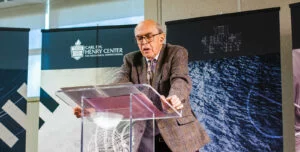The author of Plundering Eden is passionate about the need to wake up to a new way of perceiving the dire state we are in ecologically and what Christians, especially those committed to evangelical traditions, need to do about it. In keeping with the intent of this symposium series, I am not going to summarize the main arguments, but rather pick up some threads around a common theme and then probe their implications.
My focus will be on the theme of virtues in the light of what Wagenfuhr argues is wrong with humanity, but also because attention to virtues is a position that he claims he rejects. In the first place, humanity, in his view, has become a “cosmic parasite” (p. xi) and the challenge he presents is equally simple “humanity must die to itself and all that it values, in Christ, for the sake of creation” (p. xviii). He takes the idea of a cosmic parasite from “science fiction,” claiming humanity in this trope is portrayed as “the good guys” (p. xii).
Let’s take the first issue of the idea of humanity as parasite. This idea has actually been around for some time through James Lovelock’s Gaia hypothesis. Gaia theory claims that the relative stability of the gaseous and temperature composition of planet earth is only possible because of the interaction of millions of living organisms whose activity in effect act like a rheostat—keeping the variables near to optimal conditions for life instead of warming up uncontrollably as happens on other planets. Gaia also has religious connotations as Gaia is associated with the earth goddess, and this eclectic mixture of religious and scientific insights gives Gaia a potency that attracts attention among theologians,For a discussion see Celia Deane-Drummond, “God and Gaia: Myth or Reality?,” Theology, 95, no. 766 (1992) 277–85. but also prominent and influential social theorists such as Bruno Latour.Bruno Latour’s Gifford lectures focused on this topic in Bruno Latour, Facing Gaia: Eight Lectures on the New Climatic Regime (Cambridge: Polity, 2017). The fragile skin over our planet is precariously thin, and scientists and others commenting on Gaia were very quick to blame humanity at large for its activity as a species, naming human beings as “parasites,” or “a weed” on the planet.J. Ravetz, “Gaia and the Philosophy of Science,” in P. Bunyard and E. Goldsmith, eds., Gaia: The Thesis, the Mechanisms and the Implications (Wadebridge Ecological Centre, 1988), 135.
Rather than commenting on Gaia, Wagenfuhr names the more recent trope that also arises, like Gaia, within scientific discourse, but this time naming a period within geology, namely, the Anthropocene. This concept is paired in the author’s thinking with ideas of unlimited progress and humanity coming to maturity so that: “All of these beliefs demonstrate an adolescent imagination, one in which humans believe they have attained independence and mastery while remaining blind to the deep dependencies and relationships that give life” (p. 187). However, pairing the Anthropocene concept in this way is grounded in a philosophy known as ecomodernism. The Anthropocene sounds like it could foster human superiority, but only if it is perceived as a ‘good.’ Wagenfuhr is not unusual in understanding the Anthropocene as, instead, having a negative moral valence.For a discussion see Celia Deane-Drummond, Sigurd Bergmann, and Markus Vogt, Religion in the Anthropocene (Eugene, OR: Wipf and Stock, 2017). The more interesting issue for theologians, however, is the implicit theology lurking within the concept of the Anthropocene, particularly the elimination of nature as a sacred ‘other’ that has in the past been the harbinger of environmental activism.Maria Antonaccio, “Demoralising and Remoralising the Anthropocene,” in Religion and the Anthropocene, edited by Celia Deane-Drummond, Sigurd Bergmann, and Markus Vogt (Eugene, OR: Wipf and Stock, 2017), 121–37.
The difficulty with all such concepts, including grand narrative ideas such as humanity the cosmic parasite, is that human differences are blurred out and humanity at large is blamed for the problems at hand. It is quite clear that the human carbon footprint varies vastly across the globe, and even within human communities, but because the author is less concerned with ethics and virtue, these aspects are largely overlooked. Capitalism is a target for attack and also named under the label of “parasitism,” but “socialism” is labelled materialistic, indeed any “secularism” or economic system that fails to give due attention to the transcendent is found wanting (pp. 58–61). This seems to be at odds with his frequent attention to human injustices throughout the book, though he does not speak of ecological injustice, rather, environmental injustice.Environmental injustice normally means the disproportionate access to environmental goods and harms in different human populations, such as access to clean air and water. Ecological injustice refers to harms to creatures other than humanity, including, for example, loss of biodiversity and endangerment to other species. He also does not name justice in virtue terms.
The deeper and more fundamental problem for humanity in Wagenfuhr’s thinking is less about injustice and more about broken and distorted relationships of sin. He is not alone, however, in naming sin of brokenness as the root cause of contemporary ecological problems at hand. Pope John Paul II and the Ecumenical Patriarchate Bartholomew I, as well as more recently Pope Francis after them, have all spoken publicly for decades of the need for ecological conversion, metanoia from human sin.Pope John Paul II and Ecumenical Patriarch Bartholomew I. Common Declaration on Environmental Ethics, June 2002. The difference, however, is that in Wagenfuhr’s thinking the condemnation of the secular world is absolute—there is no compromise for fear of what he terms syncretic tendencies, including Pope Francis in his critique (p. 174). It is ironical, perhaps, that Pope Francis has come under attack in this way, given that he is also sharply critical of what is wrong with the world, including the use of technologies, and rampant anthropocentrism. Pope Francis’s cry of anguish against the sinful structures dominating our collective social life is at its clearest in his more recent encyclical Fratelli Tutti (2020).Pope Francis, Fratelli Tutti (London: Catholic Truth Society, 2020).
Wagenfuhr believes that any courting with the secular world is inevitably “disempowering” for the church (p. 174). His claim that Pope Francis’s proposal for robust international climate change agreements simply “cannot be realized” and amounts to a “somewhat naïve proposal” (p. 63) ignores the positive impact that Laudato Si’ had on the Paris Conference of Parties 2015 accord, and his remarkable influence at all levels of society within and beyond the church. Not all the suggestions that Pope Francis put forward are worked out in detail, as his intention was for that to be done at local levels through the principle of subsidiarity, but the promotion of solidarity with those who are suffering, especially in Fratelli Tutti, touches a strong nerve in Catholic social thought. Wagenfuhr’s The more interesting issue for theologians, however, is the implicit theology lurking within the concept of the Anthropocene suggestion that Pope Francis’s call to increase a sense of belonging by protecting landmarks and common spaces in cities is a veiled form of “making injustice slightly more tolerable” (p. 81) is obscure. It seems to be based on a strident hostility against any accommodation to secular worlds, including cities in general, described as “irredeemable.” Pope Francis is certainly sharp in his condemnation against injustices of any kind, including resisting a creeping “culture of indifference” towards those that suffer,Pope Francis, Laudato Si (London: Catholic Truth Society, 2015), §25, 52, 92. but he is not shrill in his condemnation of whole communities, but, in keeping with what he believes is laid out in the Gospel of Jesus Christ, one who does not condemn, but rather seeks to reform. He is, above all, also one who is vulnerable even within the community of the church that he seeks to serve.Austin Ivereigh, Wounded Shepherd: Pope Francis and His Struggle to Convert the Catholic Church (London: Henry Holt and Co. 2019).
Wagenfuhr also pitches centralized forms of power against promotion of individual virtues and finds both wanting for the ecological challenges at hand, naming both as implausible (p. 65). Wagenfuhr proposes reconciliation as a way forward, understood in transcendent terms. He acknowledges that “going forward in reconciliation means character development” (p. 184). However, he pulls back from accrediting this to virtue, claiming that “this is not simply the development of virtues” on the basis that its contemporary advocates:
Fail to grasp the determinative aspects of virtue and character. Those who integrate into one cosmos will define courage differently than those of another cosmos. Virtue, as the mean between the extremes, ends up being little more than the best possible means of adaptation to a cosmos in which the extremes of behavior are defined relative to the extremities of experience (p. 184).
Yet, given the resistance that Wagenfuhr has to speaking in virtue terms, he cannot avoid naming specific vices and virtues in a number of places in his argument. Pride, for example, is a barrier to genuine progress in moving forward (p. 145) where elimination of our species might seem to be divinely just act. The fact that this does not happen is a result of God’s forbearance and mercy. All these are virtue terms, as is his suggestion that humanity needs to develop a humility to both recognize the problems that we find ourselves in (p. 187), and the call of the king, Jesus Christ, who invites us to be his ambassadors here on earth (p. 154). Indeed, developing an ecological virtue approach to ethics would have filled out his suggestion that God’s people must become more like the image of God in Christ, including, drawing on Philippians 2, having the mind of Christ (p. 133). But if we are to suffer in and with creation, in the manner that Wagenfuhr aspires, this also means growth in virtue. There are, however, ethical problems with the sharp separation between the church and the world that Wagenfuhr advocates, not least because it can all too easily lead to a fatalistic sense that at the end of the day God is ultimately responsible for what happens to the world, and not humanity. This comes out particularly clearly in the following:
Just as God will raise up all humans, including those peoples now made extinct by genocide, so too can God raise up species that have disappeared, including those for which we are responsible. Perhaps we will not be able to ever clean our oceans of microplastics. But God can. That does not mean we do not try. But it means our hope is in resurrection, not repair (p. 137).
The problem with this perspective is that it can all too easily slip into a passive sense of God as having ultimate responsibility for the earth. Why, for example, should we even try if God can clean up the dire mess we have created for ourselves? It is good that peoples and species that have disappeared will be raised up, but does this then soften the deep sense of loss that has incurred?Within the biblical tradition it seems to me that there are crucial virtues that can be brought to bear that are deeply relevant for ecological concerns. A further problem arising out of the very pessimistic perspective on social structures is that the secular world seems to be largely left to its own devices. Liberation theology has sought to engage with structural sin as well as individual sin. Although Wagenfuhr speaks of injustice, he does not propose a way of remedying such structural sin as the way forward is purely within the Christian community, narrowed to those who are non-compromising within their particular interpretation of biblical faith.
What happens, then, when even aspiration for virtue is missing? Within the biblical tradition it seems to me that there are crucial virtues that can be brought to bear that are deeply relevant for ecological concerns. Theological virtues of faith, hope and love, for example, are understood in classic Christian texts as being received through revelation, but they are also sought after in response to the free will of the agents. All three work together in the moral life in order to bring about the good not just for the individual, but for the community as a whole. More importantly, perhaps, faith aligns the will of the believer with God’s divine wisdom and truth, while charity provides the affective engine that reaches out through the exercise of the will to love God and neighbor, and indeed, all creatures of the earth.
In many cases it is both challenging and difficult to decide what to do in exercising ecological and social responsibility, that may at times be in conflict.I have focused specifically on evolutionary anthropology and other animals in Celia Deane-Drummond, Theological Ethics Through a Multispecies Lens: Evolution of Wisdom Volume 1 (Oxford: Oxford University Press, 2019). A second volume that deals with sin, death and vice is Celia Deane-Drummond, Shadow Sophia: Evolution of Wisdom Volume 2 (Oxford: Oxford University Press, 2021). Developing the virtue of practical wisdom assists in such difficult decisions. But justice is also important, since both practical wisdom, justice, temperance and fortitude are the cardinal virtues that render the agent capable of acting aright at different levels, from the individual through to the family, community, nation and so on. One of the challenges in any such work is how to move away from a personalist attention to morality based on individual human acts to an account that includes the worth of other creatures. Secular science largely adopts a naturalistic perspective. A genuinely radical approach would not be to keep imitating personalism under a new guise, but move towards greater sense of holism, such as through multispecies approaches to our moral life.








Comments
Be the first one to make a comment!